You're on the Young People Site
Dedicated to self-harm recovery, insight and support.

Is there a link between self-harm and eating disorders?
Self-harm in its broadest sense incorporates eating disorders as a type of harm to your health and body. But there are also links between self-harm and different types of eating disorders. Both behaviours affect a lot of young people, and they share a lot of the same traits, such as low self-esteem, a perfectionist personality, anxiety and sometimes a history of trauma, abuse or family difficulty. Of course every person and situation is different, though, and so we recognize that although these are the common themes they are not the only reasons behind such behaviours, and not everybody will cross over between the two.
The prevalence of self-harm in people with eating disorders is thought to be about 25%, and is particularly high among people who engage in the binge-purge cycle of Bulimia Nervosa. For many, self-harm and an eating disorder co-exist, but for others self-harm can develop to replace an eating disorder or vice versa. If someone tries to give up their harming when they are not psychologically ready (for example, doing it to please someone else) then another self-destructive symptom can easily develop in its place. This is because both conditions act as ways for an individual to cope with, block out, and release intense feelings of anger, shame, sadness, loneliness, or guilt. A person needs to be able to address these feelings and find ways of dealing with them in order to break free of the harming cycle.
For some people self-harm and eating disorders could also be a type of punishment and way of expressing self-hatred towards the body. If somebody has poor self-image and is suffering with an eating disorder, they probably experience feelings of self-loathing, which in turn leads to a lack of respect for their body. This can then open the door to something like self-harm. Within the world of someone with disordered eating, especially one built around control and routines, the addition of self-harm might then also become a way of punishing the self for not sticking to a strict routine, or provide relief from the constraints of that routine. The relationship between the two conditions is complex and can differ from person to person.
Self-harm often goes alongside other emotional difficulties and it is really important that all things are considered together and addressed fully, even if it is decided that the different symptoms will be treated separately. Self-harm and eating disorders, especially when occurring together, can seem like an impossible cycle to be trapped in, but recovery from both is very possible. Seeking professional support gives someone the best chance of making a full recovery.
If you or anyone you know is affected by an eating disorder, you can talk-one-to-one with someone from Beat via their web chat service.

When someone we care about is going through a difficult experience that we have no control over, we often feel powerless to help them. We say what we think is best and what sounds the most supportive, but our words never quite feel like enough when compared with the difficulty of their situation.
I don't know about you, but I've read lots of blogs about what to say to people who are struggling with their mental health. I try to use phrases like 'That must be hard for you' and 'You sound like you're really struggling' when listening to my friend's troubles, but I can't shake the feeling that I'm simply stating the obvious.
As a Christian, I grew up in Church listening to people offering each other spiritual words of encouragement. Phrases like 'You're in my prayers', 'God has a plan for you', and 'Put your trust in him' were often said to me, to people I knew, and now by me as I've gotten older. Even though I believe that these phrases are true, I sometimes worry that they are far too easy to say, and that they simply aren't special enough.
I guess that's the thing about words though - sometimes there just aren't any that feel right to say.
And that's ok.
The act of doing something to show support for someone who is struggling, doesn't have to involve spoken words. Below are links to 5️⃣ things you can buy someone who is struggling with their mental health from some fantastic organisations that deserve your support...
1️⃣ EVERYTHING IS GOING TO BE OK A4 NOTEBOOK by Blurt Foundation
2️⃣ AFFIRMATION CARDS by Youthscape
3️⃣ 'YOU'VE TOTES GOT THIS' TOTE BAG by Young Minds
4️⃣ DINGY SKIPPER HEADWARE by Dingy
5️⃣ BE LOVED (BELOVED) ENAMEL PIN BADGE by Beloved
PS. You don't have to spend money to show someone you care. You could make them something by drawing, baking, knitting, building, creating, designing, filming or decorating for example 😄

The blog below was written by Aurora.
Even if you’re like me and don’t go in for New Years resolutions, you probably started January with a lot of excitement, great expectations and ideas of what you were going to do differently, and how you were going to accomplish all the things you didn’t get to do last year.
And now, a few weeks later, you’re probably finding that you haven’t even started on half the things you promised yourself you would do, and that your energy and motivation have taken a big dive. If that’s the case, then you’re probably feeling angry and disappointed with yourself. Maybe embarrassed, if you’d boasted to your family, friends and colleagues about what you were going to do. This disappointment can often reinforce the bad habits you were trying to beat, and this can make it even harder to get up and try again.
There are two important things to keep in mind if you’re in this situation.
The first is that it’s always difficult, after the Christmas break, to get back into the regular swing of school or work. It’s always going to be a bit jarring, so it’s natural that you’re going to be more tired in January than in other months of the year. So you shouldn’t be disappointed in yourself just because you’ve been struggling to find the necessary energy.
The second, and most important thing, to remember when planning your New Year goals is to keep them realistic. It’s very easy, at the dawn of the New Year, bursting with excitement and optimism, to set yourself really big objectives, or aim to achieve them in a brief amount of time.
For example, if you’re overweight and want to get fit, you might have said to yourself: “Okay, this year I’m going to hit the gym three times a week, and I’m going to go on a diet. No more Fried Chicken Fridays...” Or something along these lines.
You have to bear in mind that just dieting, or developing a regular exercise routine, is hard enough by itself. Especially if you’re not used to it. So attempting them both at the same time would be very difficult; particularly if you’re struggling to adapt back into school or work. You may have a better chance of success if you keep your goals small and specific. Set yourself a measurable plan instead of a few abstract ideas about what you want to achieve.
To be clear, there is absolutely nothing wrong with challenging yourself. It’s better to set the bar too high than to just skate through life with no challenge. But in order to accomplish your goals, you have to balance your desires with what you can realistically achieve, and remember that nothing worth having comes without time and effort, and the occasional lapse. Having a well thought plan will better prepare you for dealing with failures.
And remember, don’t be too hard on yourself if you stumble. It’s only January after all!
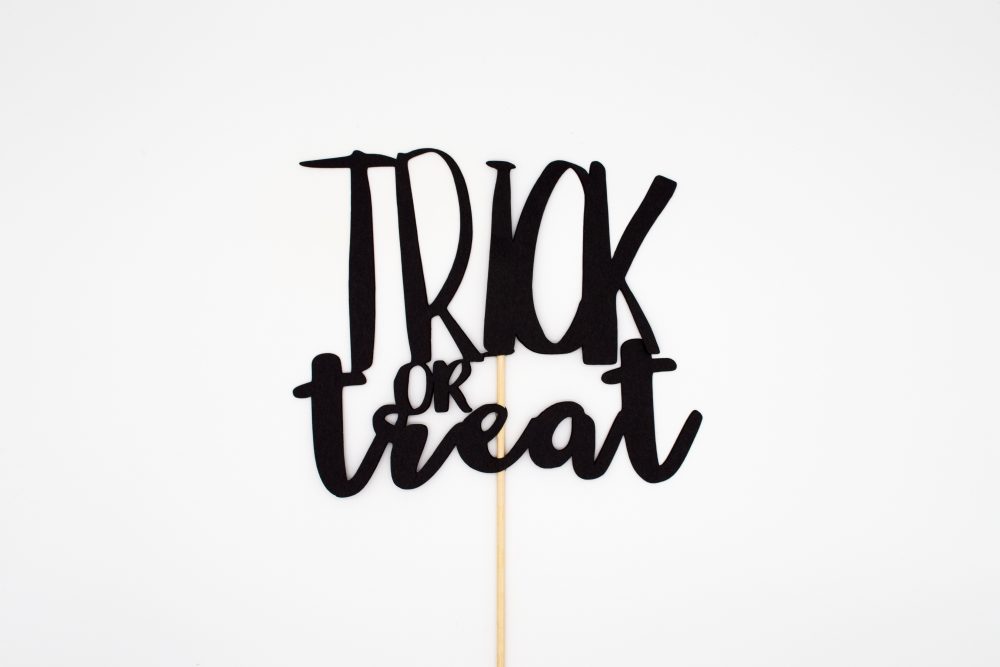
What are the things that weigh you down, hold you back and drain you?
We were thinking about this during the Hope Group earlier this week. If you don't know what the Hope Group is, you can read more about it here. What we found was - often the things that weigh us down, hold us back and drain us, are the things that bring us the most joy too.
For example, I really love my family, but sometimes it feels like they make my life a living hell at times! My mum in particular often weighs me down with lots of nagging and asking questions about what I'm doing at the weekend, and why I can't tidy up after myself. This type of criticism can make me feel increasingly drained, knocking my confidence and holding me back from doing things incase I'm no good at them.
Sometimes, writing down all the things in our head that we know are weighing us down, holding us back and draining us is a good exercise to do. This is because taking thoughts out of our head and onto paper can make them appear a lot less powerful and give us more control over them.
Here's the activity we did during the group...
Bandaged Mummies activity
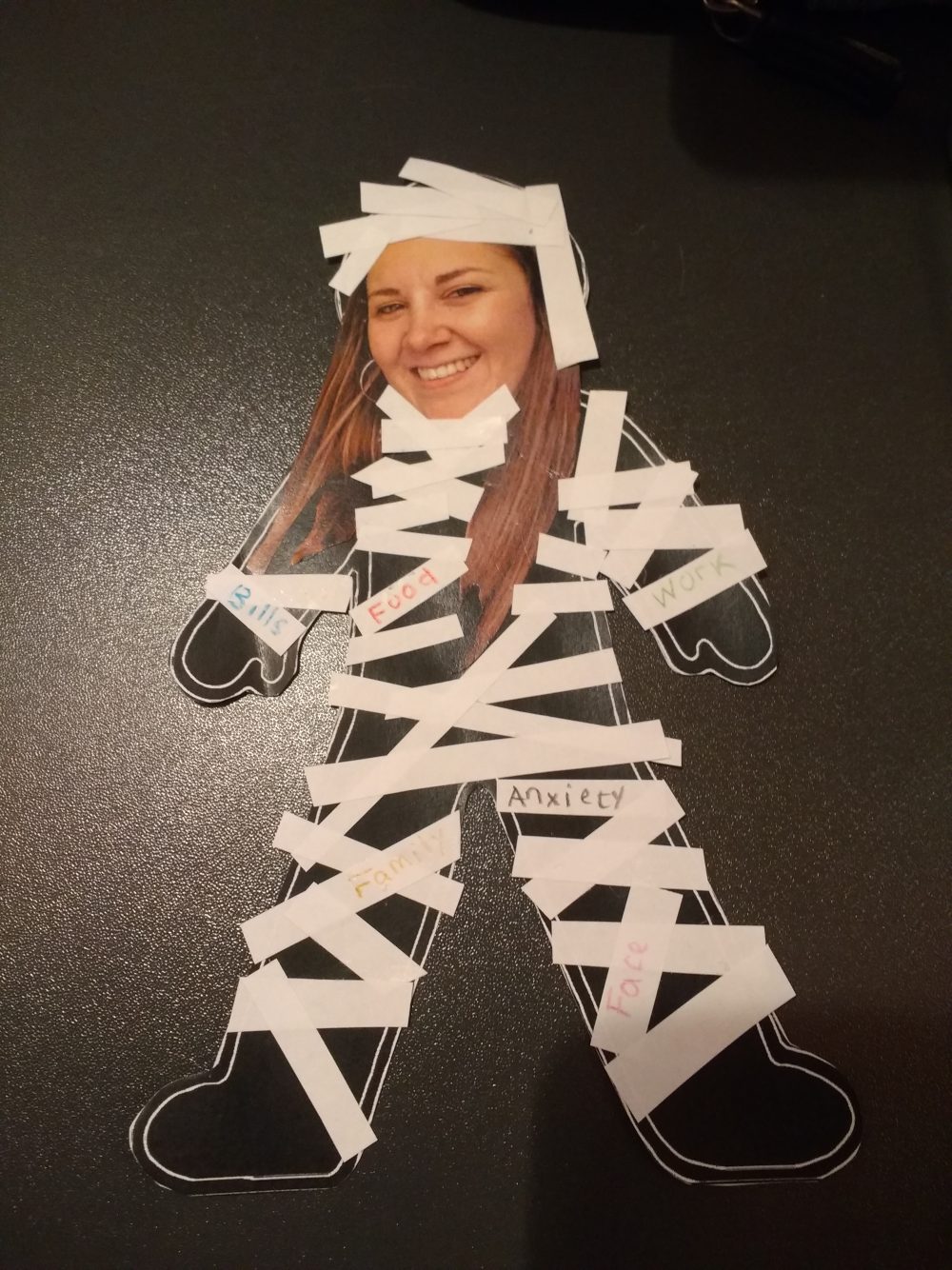
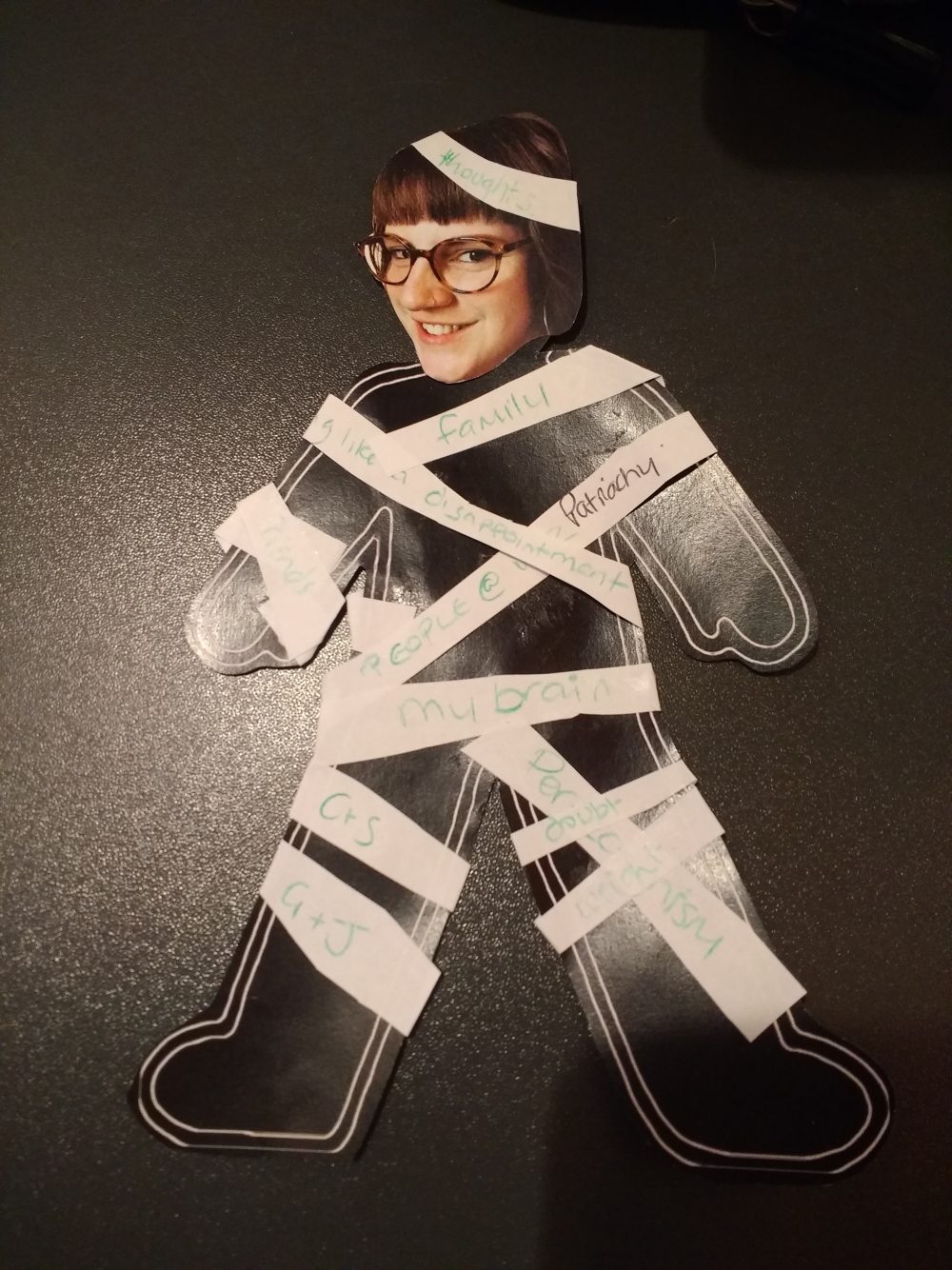
To make your own Bandaged Mummy, you will need:
- Scissors
- Glue
- Plain A4 white paper
- A photo of your head
- A piece of A4 black card
1) Use the black card to cut out a body shape
2) Cut out the photo of your head and stick it onto the body shape
3) Cut up strips of white paper and stick them like bandages on your mummy
4) Think about all the things that weigh you down, hold you back and drain you, and write them on the bandages
5) Keep your mummy as a reminder of all the things that can weigh you down, hold you back and drain you - BUT REMEMBER - you have control over how they make you feel!
Happy Halloween 🎃

I don’t know about you, but having patience is something I really struggle with. A quick Google definition search brings up that the word ‘Patience’ means ‘the capacity to accept or tolerate delay, problems, or suffering without becoming annoyed or anxious’ and the example given is "You can find bargains if you have the patience to sift through the rubbish."
You know that saying ‘all good things come to those who wait’? Well that’s all well and good, but how do I know how long I should wait?
Life can sometimes feel like a bit of a waiting game. When we’re young and at school, we wait for the Christmas holidays and then the summer holidays, and as we get older we wait for the end of school, the end of college and then the end of university. Once we start work, we wait for the pay rises, promotions and job changes; and in our personal lives we wait to buy our first car, our first flat, to meet someone, and to hopefully buy our forever home.
But not all of these things are a given and that’s where my struggle to have patience comes in. If I don’t know something is guaranteed to happen - what if I end up wasting my life waiting for it?
When you suffer from anxiety, having patience can seem impossible. My anxiety is often caused by my constant catastrophizing and endless ‘what if…?’ questions that I allow to spin around and round in my mind… “what if I never get a promotion?”, “what if I never move out of my mum’s house?” and “what if I never meet anyone?”. These are completely irrational thoughts as they aren’t based on any fact!
But irrational thoughts often cause us to act irrationally. So, instead of having patience, I regularly lose my temper and blame the people I love for the fact that I’m not where I want to be in life. Whilst behaving this way always feels good at the time, in the long run it actually makes me feel bad about myself and brings me no closer to answering those “what if…” questions.
Perhaps the key to finding patience and knowing how long to wait is to simply change the question. Instead of worrying ‘what if I never get a promotion?’, I should change the question to become ‘what if I don’t get a promotion in the next five years?’. By putting a realistic time frame on it, this not only helps me to feel positive about it potentially happening, but it also helps me to feel in control of how long I should wait, which then in turn, encourages me to be patient.
Think you could give it a go? Maybe this will help…
Let’s turn that example from Google into something a bit more relatable:

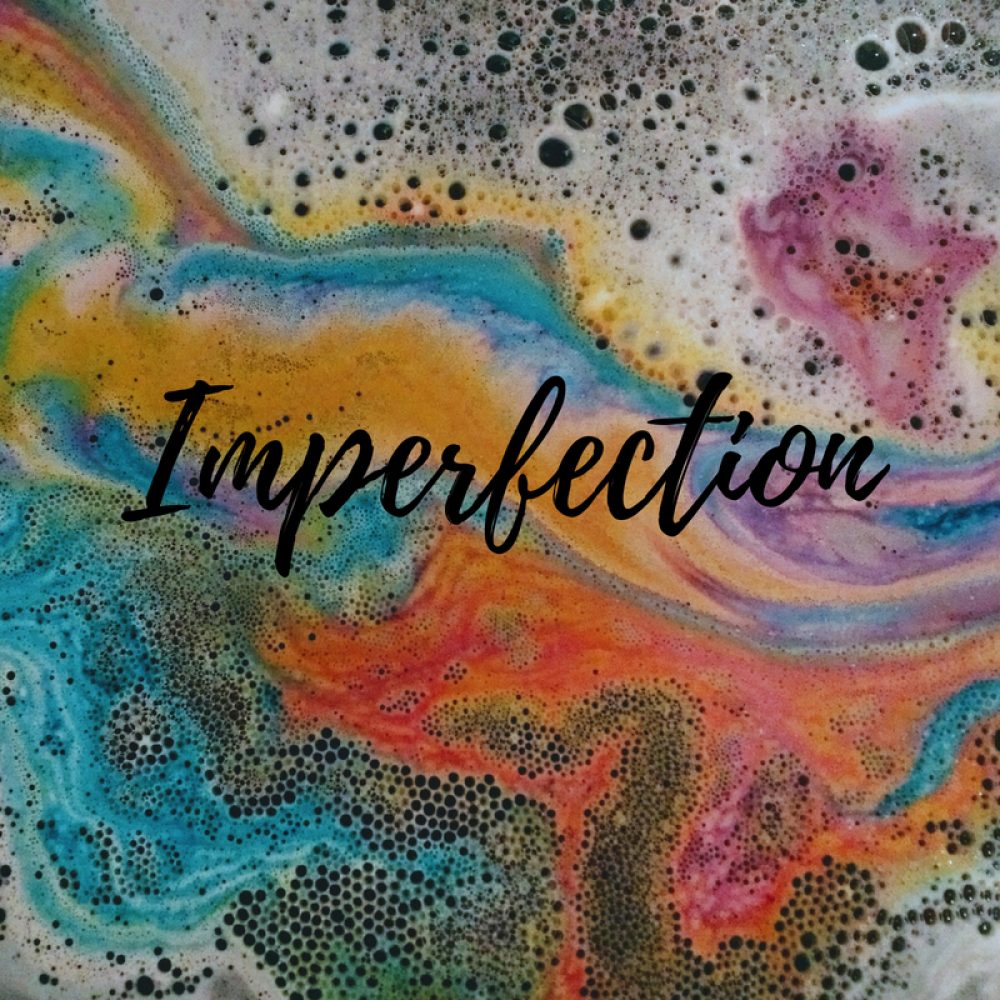
This incredibly honest and powerful blog post was written by the fabulous Miriam! Miriam co-runs an Instagram account called @themiddle_path, where you can read this and other blog posts about recovering from eating disorders, mental health awareness and body positivity. Thanks Miriam!
_____________________________________________________________________
![]() ‼️TW: Post mentions scars from self-harm
‼️TW: Post mentions scars from self-harm![]() ‼️
‼️
•
A few weeks ago a number of professional photos were taken of a very special day. The photos were beautifully done and the end result was incredible. However, looking through them something didn’t quite add up. It took a while to realise what it was but having scanned a number of pictures it was clear; my arms were smooth!
•
As a teenager self harm became a personal way of dealing with intense emotions & it has been a journey ever since. A journey where I am learning to treat my body with more care & less harm, but also a journey of learning to love what others may see as flaws/imperfections/areas that need to be improved or changed.
•
Megan Crabbe’s book(@bodyposipanda) has taught me so many lessons on loving your body & learning to not see any difference in your appearance as an imperfection. This book propelled me forward in learning to love my scars, to not hide them or feel ashamed of them. They all tell a story & the opinion of others should have no impact on the way I live my life or treat myself.
•
Having learnt to accept my scars which![]() 💥NEWSFLASH
💥NEWSFLASH![]() 💥were never an issue to begin with & then seeing them photoshopped out, hit a nerve with me & left me with lots of questions.
💥were never an issue to begin with & then seeing them photoshopped out, hit a nerve with me & left me with lots of questions.![]() 📸Are they something I need to feel ashamed of?
📸Are they something I need to feel ashamed of?![]() 📸Are they flaws?
📸Are they flaws?![]() 📸I know the journey I was on felt right but maybe they do need to be hidden.
📸I know the journey I was on felt right but maybe they do need to be hidden.
•
After some time to process & thankfully having the ability & time to talk this through with my husband, friends & therapy team I found my conclusion...
•
THERE IS NOT A SINGLE THING WRONG WITH HAVING SCARS ![]() ✅
✅
•
THEY ARE NOT FLAWS![]() ❌
❌
•
THEY ARE NOT IMPERFECTIONS![]() ❌
❌
•
THEY DO NOT HAVE TO BE HIDDEN FROM THE WORLD![]() ❌
❌
•
NO ONE, NO PHOTO, ABSOLUTELY NOTHING SHOULD MAKE YOU EVER QUESTION THE BEAUTY & VALUE OF YOUR BODY EXACTLY AS IT IS.
•
Shake the shame from your skin. You’ve done nothing wrong.
•
My body does SO much for me & it doesn’t have to be hidden just in case it meets the critical eyes of someone else.
•
This photographer wouldn’t have wanted to cause a minor crisis. Let’s be aware that what we see as imperfections might be what someone loves about themselves. All that’s needed is more education ![]()

Here at SelfharmUK we want to help people understand their harming behaviour and explore other ways to cope with life's challenges.
If you get in touch we'll listen to your story and suggest ways to help you move forward ... but somewhere along the line we'll almost always suggest you visit your GP. This can be a really tough thing to do, we know it can be scary, and can mean having to tell your parents too (though not always) but we believe it can be a significant step towards feeling better.
We asked GP David Roberts what you can expect when talking to your doctor about self-harm and whilst this article is only a guide - and not a definitive set of facts - we hope it will help you feel more in control, if and when, you walk into that consulting room...
Why do I have to go to the Doctor?
Self-harming is usually an indication that all is not right. People sometimes do it because it relieves internal tension and stress. It is not a very good way of doing this and like drugs, alcohol and smoking ultimately doesn't do any good. But in the short term it gives a temporary relief from emotional pain. However, it can be a symptom of a more serious mental illness and so your doctor can make sure you get the help you need.
Can I go on my own or do I have to take a parent?
You can legally go to the GP alone aged 16, but doctors can accept that you may be able to make your own decisions about your health (eg contraception) from 14 if they think you understand things and are mature enough to do so. A doctor would want you to involve your parent(s) in your care until you are 16 and are likely to encourage you. They would not give you an injection or carry out an operation, or even do an intimate (embarrassing) examination (physical check) without your parent's permission before you are 16.
How can I get ready for my appointment?
Even if you are under 16 That does not mean that you cannot talk to them about your problems or issues. It is a good idea to think about what you want to say and write the main points down. Lots of people get embarrassed at what they want to say and so don't get to the point. Doctors are busy and don't get embarrassed by what you think or say, so it is better to take a deep breath and say it right at the beginning rather than put it off. They won't mind and it will give them more time to talk to you than if you spend the first five minutes talking about a rash that no one can see because it really isn't there! Think about what you want to get out of the appointment - do you just want to tell someone and get it off your chest, do you want help stopping it, do you want them to refer you on to someone who could give you specialist help? If you tell them what you want then they can work out how best to support you.
What will happen if I say I self harm?
Self harming is quite common and they will have seen other people who do it. So they won't be shocked, but they will be concerned. The biggest concern they would have is that you might want to kill yourself. Not many people who self harm want to do this but doctors have a professional duty to assess the risk of that happening. they are obliged to keep what you say confidential and private between you and them, unless you tell them something that they think might indicate that your health is seriously at risk (or you might be planning to do something that might endanger someone else) - see later - in which case they may be obliged to break your confidence. They should tell you this. They will want to help you, and so if you have plucked up courage to tell them, they will try to find ways to do that.
What will they ask me?
This might include asking some deep questions which you might find embarrassing: don't be though, they're only trying to work out what's making you do this. They'll ask about cutting, taking drugs, overdoses, and other ways you might be tempted to hurt yourself. They may ask you about how you feel (low, depressed, crying, worried, frightened, angry) and how things are at home or school or work. If they feel you trust them they might ask you to come back again to see them, and they might suggest that they refer you on to see a specialist from the CAMH service (people who work most of their time with young people with similar problems). They might encourage you to speak to a counsellor at school, particularly if there is someone there you feel you can talk to. They will want to know why you have come to see them at that time and to find out what help you want them to give you. You may not be able to say this, but if you've thought about it beforehand it will help.
Do they have to tell my parents?
They are obliged in law to protect you and others from actions you might take that might harm you or others. But they need to check how likely your might be to do something you say you want to do so they will question you quite hard. If you are under 16 and they think you are suicidal (or planning a murder!) they will have to tell your parents or other authorities. They will still encourage you to involve your parents as they have legal responsibility for you, but if the risk is low in their view, they will try their best to keep what you say confidential.
Will I have to show them where I have self-harmed?
They can't and won't force you (unless they are seriously worried about you being in danger and even then they will ask for advice from someone who specialises in child protection). They will want to assess how bad your injuries are - you might need antibiotics if your cuts are infected, and you might need dressings to protect the wounds.
Remember they aren't easily shocked or embarrassed and really want to help you - showing them the extent of your cutting will help them work out how serious the problem is and how to get you the best help.
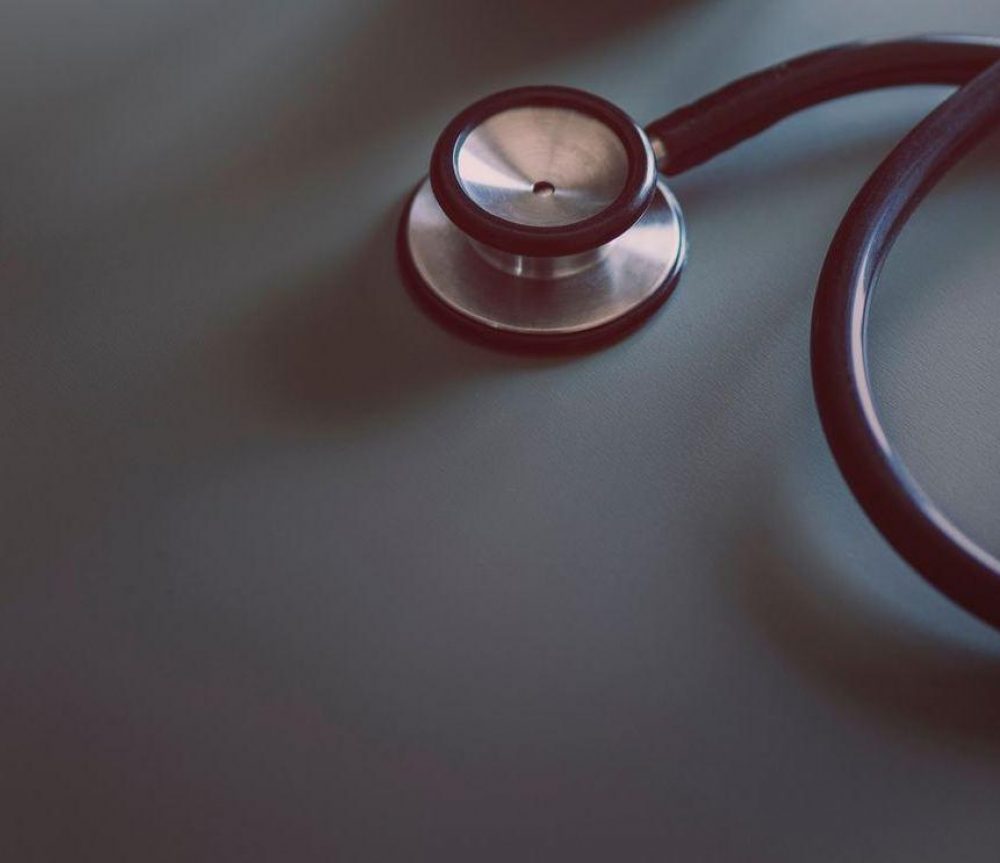

There are so many things we can achieve in life – whether it’s the first steps in walking; being able to read; working out a maths problem or getting your first job – we learn new things daily.
One thing I think is way harder than anything else to achieve in life is forgiveness.
It sounds so easy yet is so very, very hard to do. It’s a long process – we might say ‘we forgive you’ but the feelings of resentment, hurt and anger are harder too control.
Forgiveness is a choice – it involves our brain deciding on it as it’s a choice; it involves actively putting it into practise and it involves letting go of the emotions that are so strong – even more so if we need to forgive ourselves.
We all make mistakes; perfection isn’t real and doesn’t exist (see the vlog on perfectionism); we are going to mess up – life is a learning curve. In the same way it took most of us about 18 months to walk; it takes years to forgive.
Forgiving yourself is the same process as forgiving someone else, but often harder as we are the forgiver and the forgive (the person being forgiven) so most of us go through a cycle of being kind to ourselves about the mistakes we have made; then, once we feel the resentment/anger creeping back, we are even harder on ourselves than before – and so the cycle continues……
Breaking the ‘forgiveness/self- anger’ cycle takes time; a lot of daily positive self-talking (list things you do like about yourself), often physically writing what you forgive yourself for (arguing with people, saying unkind things, not doing as well as you could…) and learning, again and again, to tell yourself ‘ I am human. I will make mistakes. I am forgiven. I choose to forgive’.
It’s a life time mantra - it will take forever because our life is about journeying to grow as people, so be gentle to yourself and start your self-forgiveness journey today.

Don’t you sometimes feel ‘stuck’? like life has moved on for everyone else but you? I do. Often. I make mistakes, I mess up, sometimes worse than others. I hurt people I love, I say unkind things and I think very unkind things often.
I am not perfect.
I am definitely not perfect.
Yet…I have moments that I can think ‘hey, you did the right thing there’….have a think, recall when you have done something kind for someone else?
Being human means we are both the best and worst of ourselves: we excel and we disappoint ourselves. Every day.
We have the capacity to flourish and ‘fail’ at the same time: in one area of our lives we can be gentle, caring and a lovely human; then, we can flip to the other side in an instant.
You aren’t the only one: we are human, we all do it. Loads of times a day.
Instead of berating your darker side, the bits you don’t like and feel you ‘fail’ at – accept them. Recognise them, without squirming in your seat. Say aloud your failings.
Now say aloud your kind acts, your gentle side, your caring nature; list the people you have helped and listened to, draw the faces of those over your life who you have a positive impact on, write the deeds you have done that has made someone say ‘thank you’, think of their smiles….
You aren’t failing at life. You aren’t a failure. You are human.
Being human doesn’t involve punishing yourself, apologizing for everything and anything, feeling guilty about what you didn’t do…being human allows you to have a better self and a less better self.
It takes a life time to work yourself out, to recognise the good in you – begin that journey today by, admit your ‘shadow’ self and your ‘light’ self (good/less good)and let yourself off the hook today for something.
Walk gently through life, helping where you can, accepting there will be times you can’t.
That’s ok.

Please be mindful that this post has a Trigger Warning ‼️
My best friend Regan tells me what she does to herself in a quiet voice. We’re sitting in the back of Geography class, and nobody’s listening to us because everyone messes around in Geography. She’s leaning in like we have a secret between us, and she rolls up her sleeve and shows me her forearm. It’s covered in thin red lines, which are too straight to have been done by a cat or a bush or by accident. I’ve never seen anything like it before, and I don’t know what to say.
“It helps,” Regan says.
Because I don’t want her to regret telling me, and because she’s my best friend, I say, “If it helps, then I guess that’s okay.” But I don’t think it’s okay. I’m worried about her, but I don’t know how to tell her that without sounding judgemental. If this is how she copes, then it’s okay, right? Everyone knows that other girls in my year are self-harming.
I keep looking at the cuts on her arm, and she pulls down her sleeve again to cover them up. She’s not wearing bandages, so her scratchy jumper must be rubbing against them. I’ve been cut before, and I know how it itches and stings when it’s healing.
“You won’t tell anyone, will you?” she asks. “It’s not so bad, and I don’t want them to make me see the counsellor.”
I want to tell her that I can’t keep this to myself. I have to tell someone, because this is serious, and the counsellor will be able to help her talk about this. I don’t want to be a snitch, but she’s my friend, and I care about her. But I’m her best friend, so maybe I can help her better than a counsellor? And if I tell on her, then she won’t trust me again. I have to keep this a secret, even though I don’t really want to.
“Of course I won’t tell anyone,” I say.
Regan smiles. “Thanks,” she replies. “You’re the best.”
***
A week later, we have P.E. and Regan stands with me in our corner, still wearing her long-sleeved jumper. I realise that she doesn’t want to get changed, in case someone sees her arms, and I quickly stand in front of her, blocking her from everyone’s view. It’s not fair that she can’t get changed in case someone sees her cuts, and I don’t want her to get in trouble because she’s not changed in time.
“Thanks,” she whispers, and then she takes a rugby jumper out of her bag, even though it’s summer, and we’re supposed to be wearing short sleeved shirts. I don’t say anything, but I know people will notice that she’s wearing it. I hope the teacher notices, and realises why, and tells the nurse, so that someone else can do something about this, and I don’t have to be the only one who knows.
I stand and wait for her to get into her kit, blocking her from everyone’s line of sight. We don’t say anything, and then, when she’s done, we head for the exit together. We’re the last ones there, so I can talk about it.
“Aren’t you going to put bandages on them?” I ask. I saw her arms when she pulled her jumper off, and they were still uncovered. There were small red smears where the material of her clothes rubbed against them, and streaked down her arms.
“I don’t need to,” she replies bluntly. “Look, I don’t want to talk about this right now, okay? Someone might hear.”
So, I don’t say anything else. I don’t want to upset her, or have an argument about this. We walk out onto the playground, and a few other girls look at Regan, with her thick, long-sleeved, rugby shirt. Nobody asks why she’s wearing it.
***
Regan keeps scratching her arms under her jumper. I want to tell her to stop, because it can’t be good for her, but I don’t want to seem pushy.
She keeps itching, and eventually I can’t ignore it anymore, so I say, “You shouldn’t do that.” That’s all I seem to do these days – tell her what she should and shouldn’t do, ask her questions, bug her. I'm like a broken record. But if I don’t tell her, then who will? I’m the only person who knows. But I’m worried, because she’s obviously getting annoyed by my nagging.
“It itches,” she says sharply.
“Haven’t you put anything on it?” I ask, but I don’t know what to put on cuts. I use Bio Oil for spots. Maybe that would help? But, before I can suggest it, Regan says, “I wish you’d stop going on about it. It’s fine.”
“It’s just – if you’re going to do it, you should take care of it,” I say. I just don’t like the idea of those injuries going unchecked. But it comes out wrong, so it sounds like I’m lecturing her again.
Regan folds her arms. “God, I wish I’d never told you.”
I don’t know how to respond to that. After a moment, I say, “It’s just a lot to handle. I want to help, but I think you should tell someone.” I know how it sounds, but it’s true.
She glares at me, and it looks like she’s going to say something else, but she doesn’t. She just walks away.
***
Four days later, in first period, my phone buzzes with a text alert. I look at it under the desk, and it’s from Regan – I need to talk to you @ lunch.
So, at lunchtime, I wait in the form room, in our usual spot. We haven’t spoken since our fight, and I’ve missed her. She walks in and sits next to me.
“I got them bandaged,” she says. There’s no need for her to say what she means. I know. I don’t say anything else, hoping she’ll continue. And she does. “I thought about what you said, and you’re right. You shouldn’t have to handle this by yourself. It’s a lot. I know you care about me.”
“Yeah, I do,” I reply, a little awkwardly. This whole thing is pretty awkward, and she looks embarrassed too.
“I just thought that, if you were really my friend, you wouldn’t want me to go to someone. But I can’t tell you everything.”
I’m so relieved – for her and myself – that I can’t help but smile. “It’s not that I don’t want to hear what’s going on with you –” I say, at exactly the same time as she says, “I don’t wanna be a burden –”
We both laugh, because we talked over each other, and she smiles at me. “Thanks for helping me with this,” she says.
“It’s okay,” I reply. “You can tell me stuff, okay? It’s not that I don’t want to hear what’s going on with you. But I have to know you’re getting support from somewhere else too.”
“Yeah,” she agrees. “I get it.” And then, after a few seconds, she pulls me into an unexpected hug, and I feel the bandages underneath her jumper. It’s a small sign that she’s taking steps in a positive direction, that she’s trying to help herself. It’s all I need, and I hug her back, tightly. “You’re a good friend,” she says.
This short story was written for SHAD2018 by Sophie, a Graduate Volunteer at Youthscape working alongside the SelfharmUK team.

Self-harm is a way of harming our bodies in a variety of ways; most of them around us feeling out of control in some way.
This week is Eating Disorders Awareness Week. Eating disorders come under that category as the effects are on your body, as well as emotions and having psychological effects. For most people, they begin gradually, over a period of time: maybe skipping a meal? Taking up exercising a few times a day? Things that can appear to actually be ok and not cause anyone to notice as they slowly develop…however, what started as a way of taking control and coping, can soon become an addiction.
Addictions start small scale: one day at a time incidents “I’ll do this today because I feel like this today….”, however, it doesn’t take long for the addiction to take control of our feelings and become the master of us. Habits are formed within 30 days, so our brain rewires itself to follow our actions – both positive and negative.
Eating disorders encompass a huge variety of issues around disordered eating from bulimia (eating and then vomiting), to anorexia (self-starving) and binge eating (eating loads and loads); yet they all have some similarities:
- They actively harm you. Sadly, the harming factor is unseen on your insides as organs become weak the longer the you don’t eat (this includes your heart). Those struggling with overeating, may find their bodies absorb the fat and develop associated issues with that. Eating disorders impact your teeth (from vomiting), your bone structure (from lack of calcium), your hair and nails from lack of nutrients… most parts of your body will be effected by disordered eating.
- They limit your social life. Globally food centres around communities: family meals, birthday meals, getting pizza with friends… If food is causing you anxiety, then it’s highly likely you will decline these offers and feel more isolated than you felt before your eating disorder developed.
- Help can be given, when you are able to ask for it. As with any addiction, help needs to be acknowledged before it can be taken. Having an eating disorder is an inner fight: your body needs a healthy diet to sustain itself, yet your brain is fighting that natural urge to eat well. The fight is emotional and psychological and very tiring for the sufferer.
- There are stages in every eating disorder; the initial stages as the sufferer gradually believes they feel ‘good’ from the feeling being in control gives them, followed by the ‘maintaining’ phase where a sufferer develops a routine and possible rituals around their food issues; this is followed by a deteriorating stage. By this time friends and family will possibly have noted the change in appearance, mood, sleep patterns and demeanour – this is when Doctors are likely to become involved in order to keep your BMI and heart rate in as healthy way as can be hoped for.
- Friends and family can find excellent support and further information at www.b-eat.co.uk who run online support sessions for young people, adults and family members.

Forgiveness takes a lifetime. It’s a learnt process that ebbs and flows in our life: some people we can forgive quickly and easily, others it is painfully hard to allow ourselves to ‘let go’.
If a friend or family member is self-harming it can be hard not to feel hurt, angry or betrayed even. You may be angry that they didn’t tell you sooner or angry that they didn’t come to you as you may feel you could have helped them before it got to self-harm; you might feel very hurt by them and their lack of trust in not being able to ask for help; you may feel betrayed that they appear not to trust you enough with their thoughts and feelings.
If you are feeling like that; forgive them. You may feel that you have outwardly but perhaps inside those feelings still bubble up from time to time. Forgiving takes a long time – it’s a choice that you have to choose each time those feelings creep up on you. Forgive your friend, their self-harm is not your fault, it’s not something you could do anything to stop and it’s not yours to carry.
Chances are, they didn’t want or mean to hurt you. Often people who are struggling with self-harm carry huge bags of guilt and they might be harming their bodies as they don’t want to hurt anyone emotionally.
It takes a great deal of maturity to be able to let go of your own hurt and put yourself in someone else’s shoes: today, on Self-harm Awareness Day, take some time to think about forgiving your friend and consider what it might be like to walk in their shoes.
As a friend your role is to support and get your friend to get some help from people trained to do so; if you want to, why don’t you and your friend sign up together to our Alumina support programme?
Whether you are self-harming, or are friends with someone who is - you are never alone.

*TRIGGER WARNING*
Occasionally, but not always, you might need to decide if you need immediate medical help.
It could be that either accidentally, or deliberately, you have harmed yourself and now, you feel scared about the impact of it on your body.
It maybe that you need to dial 999 immediately: is your cut very deep and bleeding near an artery? Is your burn severe? Have you swallowed something? Get someone to call 999 or call it yourself. No one will be cross with you for taking up NHS time; it could save you.
If not 999 then:
Firstly – breathe. Slowly. Get control of your body by getting oxygen to your brain – I know it sounds stupid, but it’s harder to make rational decisions and deal with an emergency if you are in panic mode.
Secondly – if you are bleeding – press down on it firmly. Hold it there. If you need to, tie something above the injured area to stem the bleeping. If it’s a burn – run it under cold water for at least 20 mins, then wrap it in cling film.
Thirdly – if, after 20 mins, you are still bleeding/feel a burning sensation – get to the hospital.
If you are hesitant about what to say write down, or get someone to write down the following for you, so you don’t have to repeat yourself: your full name/school/address/GP/what you have done/how long ago/what you used, drank, swallowed, how long you have been self-harming. Doing this will help you loads and give medics the information they need immediately to know how to treat you.
If you do get taken to hospital, you may feel unwell on the way. Having someone with you will help you.
